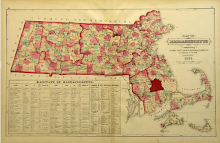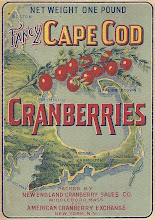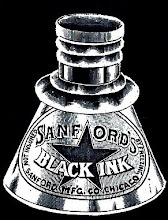Lawrence, who was born in Fall River in 1868, began his interest in farming at the time he entered the ministry. Ordained in 1890, Lawrence always occupied rural pastorates, the first three being at South Dartmouth, North Egremont, and Lanesboro. The interest in farming became all-consuming for Lawrence who came to consider himself, first and foremost, a farmer. "There is more room in the world for a farmer who can preach than there is for a minister who has a farm to get a living," Lawrence believed.
In 1896, Lawrence began his work in experimental farming, which he continued after his arrival at North Middleborough. Experiments in cross-pollination were rigorously conducted by Lawrence who argued that "every farmer should engage in experimental work and see what he can learn. I do considerable and have found it very beneficial and profitable."
Lawrence claimed to have under cultivation "probably more varieties than any other private place in the United States." This included 90 varieties of garden peas, 75 varieties of lettuce, 45 varieties of sweet corn, and, ultimately 300 varieties of potatoes.
Previously, potato experimentation had been conducted at the Arlington Trial Grounds, but, in 1904, were transferred to the Lawrence farm. Seed potatoes were planted under the direction of representatives of the U. S. Department of Agriculture, and conditions were carefully noted. Each of the three hundred varieties was planted separately and marked with tagged stakes. Lawrence made weekly reports upon their progress. When the time came to harvest the potatoes, the work had to be done by hand so that each variety could be bagged and labelled for the following season. State and Federal agricultural experts would be present to oversee the work.
 Later, Lawrence devoted greater attention to the growing of fruit. In the first years of his Middleborough farm, Lawrence cultivated seedless varieties of watermelons and apples, but he later turned to berry cultivation. As Mrs. Romaine notes in her history of Middleborough, "Lawrence drew wide attention by his experiments in berry growing." The experiments in question related to the possibility of the commercial cultivation of huckleberries, and these experiments were reported in the Boston Globe at the time. Lawrence transplanted a wild huckleberry bush from a nearby swamp to his farm, where it flourished, despite the lack of any special encouragement. It produced berries "almost as large as small cherries and which grew in clusters of 15 to 30."
Later, Lawrence devoted greater attention to the growing of fruit. In the first years of his Middleborough farm, Lawrence cultivated seedless varieties of watermelons and apples, but he later turned to berry cultivation. As Mrs. Romaine notes in her history of Middleborough, "Lawrence drew wide attention by his experiments in berry growing." The experiments in question related to the possibility of the commercial cultivation of huckleberries, and these experiments were reported in the Boston Globe at the time. Lawrence transplanted a wild huckleberry bush from a nearby swamp to his farm, where it flourished, despite the lack of any special encouragement. It produced berries "almost as large as small cherries and which grew in clusters of 15 to 30."
Despite the scope of Lawrence's experiments and the number of vegetable and fruit varieties grown on his farm, only about four acres of land were cultivated. Specifically in regard to the experimental potato patch, this acreage contrasts greatly with the nearby State Farm at Bridgewater where some 65 acres were devoted solely to the cultivation of potatoes.
Lawrence was generally employed in farm work four or five days a week from 7 a.m. to 5 or 6 p.m., and was assisted in this work by his father, James Lawrence (1835-1910). The remaining days would be utilized by Reverend Lawrence to prepare his Sunday work. "He frankly states that he can use this time to good advantage farming, and does not visit his parishioners when they are well, but when they are sick he is always on hand to offer consolation and assistance."
Lawrence also gave his parishioners practical demonstrations of farming, and shared agricultural advice with them, "and for this reason, if no other, he has come to be one of the most popular pastors of the Baptist Church in the north precinct of the town."
"For myself, I try to keep ahead of my members in all branches of farming, as many of my members are engaged in that pursuit, and then I can always give them points on farming, and by thus assisting them have a better hold upon them. I can teach the spiritual lessons on a broader scale if I have the outdoor training which is incidental to farm life, and many of my best inspirations for sermon topics have come to me while at work in the field," Lawrence believed.
Lawrence left his pastorate, potato patch and experimental farm in 1907.
Illustrations:
"Potatoes", photograph by Eleanor Martin, August 16, 2009. Used under a Creative Commons license.
Joseph Reynard Lawrence (1868-1925), photograph, c. 1893, Emery, Rutland, Vermont.
Reverend J. R. Lawrence about the time of his wedding in 1893.























+of+Smoky+Mountains+018.jpg)
0 comments:
Post a Comment